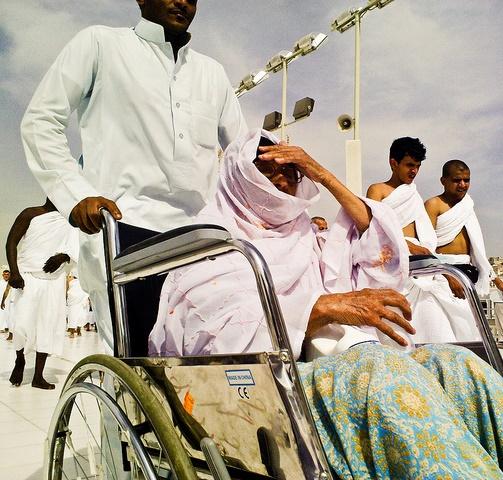After 2 days with no new MERS-CoV cases, Saudi Arabia today announced three infections, two of them in Riyadh, as a survey found that people from Turkey who planned to make Hajj pilgrimages had little understanding of the disease and its risk factors.
The Hajj began on Sep 21 and is expected to draw more than 2 million travelers at a time when Saudi Arabia's capital is battling a large hospital-linked MERS-CoV (Middle East respiratory syndrome coronavirus) outbreak with smaller hot spots recently detected elsewhere, including the holy city of Medina.
Health worker infected
One of the two cases reported from Riyadh is likely related to the hospital outbreak at King Abdulaziz Medical City. The patient is a 27-year-old female foreign healthcare worker who was exposed to the virus in a health setting, according to a statement from the country's Ministry of Health (MOH). She has an asymptomatic infection and is listed in stable condition.
The other individual is a 52-year-old Saudi woman who in stable condition and is a household contact of an earlier case. Since Jul 21, 170 cases have been reported in Riyadh, many with connections to the hospital outbreak.
The third case involves a 93-year-old Saudi man from Al-Oyoon, located in the east central part of Saudi Arabia. He is in stable condition, and the investigation into the source of his illness found that he had contact with camels.
One earlier announced patient has recovered from MERS-CoV, raising that total since the virus emerged in humans to 678. Currently, 39 people are still being treated for their infections.
The latest developments lift Saudi Arabia's total from the disease to 1,249 cases, which includes 532 deaths.
MOH ramps up reporting details
Over the past few days, Saudi Arabia's MOH has changed the format of its daily MERS-CoV updates to include breakdowns on probable infection sources and more information on symptoms. Lack of details on asymptomatic cases was one criticism aired in a recent comments from the World Health Organization's (WHO's) MERS-CoV emergency committee, which based much of its assessment on a WHO mission to Saudi Arabia to investigate the country's surge in cases over the past few months.
MOH statements now include a pie chart listing exposure breakdowns. For example, 45% of cumulative cases have involved healthcare settings—33% of total cases involve patients who contracted the virus in healthcare settings, and 12% are in healthcare workers who got sick in hospitals.
Thirteen percent of MERS-CoV cases involved household contacts, and 38% of patients are considered to have had primary exposure (such as related to camels.) Exposure isn't known for 4%.
Also, the MOH is now providing more detailed information on infection sources for each newly reported case.
Knowledge gaps in Turkish pilgrims
In a separate development today, a public health clinic survey of Turkish citizens who planned to travel to Saudi Arabia this year for the Hajj or Umrah pilgrimages knew little about MERS-CoV and how to prevent it. Researchers from two health clinics in Samsun, located on Turkey's northern coast, reported their results in the latest issue of Eurosurveillance.
The team conducted face-to-face interviews using a 16-question survey from early May until late July. Of 381 respondents, 55% (212) had never heard of MERS-CoV, and only 34% (129) knew that MERS is a respiratory disease.
Of those who knew of the disease, 60% had heard about it through newspapers or television, 25% from healthcare workers, and 4% from religious officials.
Three quarters of the respondents said they didn't intend to take protective measures against MERS-CoV. Also, researchers found that 64% (244) of the people met at least one of the conditions, such as hypertension or diabetes, for which Saudi officials advise travel be postponed, but none decided to put off their trips.
The authors noted that similar surveys done in France and Australia also identified MERS-CoV knowledge gaps in Saudi-bound pilgrims, but that knowledge about protective measures was lower in Turkish respondents than those in the French and Australian surveys.
The researchers suggested that healthcare providers and religious leaders could play a stronger role in increasing awareness about the disease and how to prevent it and that attitudes and behaviors of potential pilgrims can be improved by stronger educational measures surrounding MERS and other infectious diseases.
See also:
Sep 24 Saudi MOH statement
Sep 24 Eurosurveill report





















